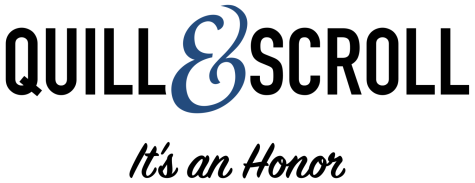THE WEEKLY SCROLL
September 10, 2020
News, tips and advice from Quill and Scroll
The Lede
Digital Headlines
Millions of students start the school year without reliable educational materials
Students across the country walked away from in-person learning in March without the certainty of a return date. Now that the time has come for classes to resume for some students for the first time in six months, the virtual and in-person learning landscape looks vastly different than it did the prior school year.
Online learning plans for multiple schools do not provide in-depth lesson plans or heavily interactive course content. Even so, the technology needed to complete even menial tasks online needed to be backed-up, planned and able to handle the influx of students who will use the programs on a daily basis. For many school districts, this isn’t the case. Read below about return-to-learn plans across the country and the faults of online learning:
“Lost Summer: How Schools Missed a Chance to Fix Online Learning”
“It’s not just you. Zoom is down across the US”
“Website Crashes and Cyberattacks Welcome Students Back to School”
Facebook receives more backlash over controversial company views
Facebook continues to be at the center of a debate regarding free speech and the social marketplace. After an emergency Facebook town hall meeting in June, the most popular response from employees was, “Can we please change our policies around political free speech? Fact checking and removal of hate speech shouldn’t be exempt for politicians.”
The question has remained since then. Facebook’s community guidelines received a major overhaul after the Cambridge Analytica scandal that rocked headlines and comments from political leaders, including “Fake News” blasts like that video showing Nancy Pelosi (D) “drunk.”
Facebook employees are leaving the company for such scandals. Former Facebook Engineer Ashok Chandwaney left the company Tuesday because of Facebook’s, “platform has become a haven for hate.”
Read his official statement here.
Vaccine? Guess again
Dr. Sanjay Gupta comments on the halt in production of AstraZeneca’s COVID-19 vaccine.
It’s An Honor
Q&S Fall Deadlines
News Media Evaluation
We will be ready to name our Gallup Award winners and other results of our annual News Media Evaluation next week! Stay tuned for that news, and if you submitted your publication for critique, you’ll be getting that critique back very soon.
Q&S Student Board members named
Quill and Scroll is excited to announce the members of our 2020-2021 school year Student Advisory Board! Here are the eight students chosen by Quill and Scroll to serve:
- Emma Diehl, J.W. Mitchell High School, New Port Richey, Florida
- Jennifer Xia, Northview High School, Johns Creek, Georgia
- Emily Rivera, John A. Ferguson High School, Miami, Florida
- Paige Jansen, Ade-Desoto-Minburn High School, Adel, Iowa
- Grant Johnson, Rock Hill High School, Frisco, Texas
- Calina He, Carmel High School, Carmel, Indiana
- Kathleen Ortiz, Kingwood Park High School, Kingwood, Texas
- Mizuki Kai, Bellair High School, Bellair, Texas
Read more about how these eight students will be serving Quill and Scroll this year here.
FREE Google Tools training from SPJ and Quill and Scroll
Sign up today to take part in a training provided free by Quill and Scroll in partnership with the Society of Professional Journalists. The training is set for 2 to 4 p.m. CT, Wednesday, Sept. 23.
Learn about all of the free Google tools that can help your newsroom build interactive charts, maps, visualizations and more. This is a hands-on workshop, so be sure to bring your laptop and smartphone.
Tools we’ll cover: Google Flourish, Google Dataset Search, Google Fact Check Explorer, Google Earth, MapChecking.com, Google Trends, MyMaps, Earth Engine Timelapse, data scraping with Google Sheets and more.
More information on SPJ Trainer Mike Reilley and the registration form is on this page.
It’s never too late to honor seniors and induct members
If you put off your spring celebrations, you can still induct new Quill and Scroll members and honor seniors this fall. We’re able to take and fulfill orders, even as Quill and Scroll staff work from both our home offices and our offices at the Adler Journalism Building on the University of Iowa campus.
We published this update earlier in August. It includes a simplified order form for schools and advisers willing to pay via credit card, and an offer to host an online induction ceremony for your students. The sooner you induct new members, the sooner they’ll be able start planning chapter activities in the spirit of Quill and Scroll. Here’s a link to a PDF file of the Q&S Chapter Handbook if you don’t already have it.
A reminder about cords:
Students MUST HAVE BEEN OR WILL BE INDUCTED into the Society to earn the honor to wear an Honor Cord (GHC) or Honor Cord with Insignia (GCI). If you order cords for non-members, please choose the Non-Member Cord Option (NCD). Quill and Scroll exists because of the special unifying bond brought about by membership and the lasting legacy of the induction ceremony.
And, as always, feel free to email [email protected] if you have any questions.
Yearbook Contest
The Yearbook Excellence Contest deadline is Oct. 17 for all 2020 books. Students may enter their work in 18 categories, and all individual entries are $5. Theme Development entries are $10. There’s no limit on the number of individual entries a school may complete. Each school is limited to one Theme Development entry.
Competition is divided by school size, with Class A consisting of schools with 750 students or more, and Class B consisting of schools with 749 students or fewer. Begin your entry process here.
What’s Hot?
‘Rage’ release
#TrumpKnew and #Woodward trending on social media after book excerpts released
Veteran journalist Bob Woodward created a couple of furors this week when he began releasing excerpts of his new book, “Rage.”
Among the many revelations was that President Trump knew in early February that the coronavirus and COVID-19 would be a devastating plague on the U.S. Why does it matter? Trump continued to hold rallies throughout that month and continued to tell the American public that COVID was a “hoax” and that it would magically disappear in the spring.
Woodward’s troubles started when people started questioning why he didn’t release the audio tapes of the interviews earlier. If the president was spreading disinformation throughout the spring, why wouldn’t a journalist tell us?
Here’s a good summary from CBS News:
Just A Thought
‘Amplify student voices’
Student Advisory Board members on the value of scholastic journalism
Emma Diehl, J.W. Mitchell High School, New Port Richey, Florida
The value of scholastic journalism in my school and my community is that it allows for us to tell the stories that no major news sources would cover. Scholastic journalism allows for student journalists to train for their future career field, while also highlighting what is so special about their school. For students, it’s a chance to be recognized, and for journalists, it’s an opportunity to advance their skills, and even compete in regional and national competitions, as well as trainings, which look great on college applications.
Jennifer Xia, Northview High School, Johns Creek, Georgia
Scholastic journalism in my small suburb allows us to highlight the voiceless. Oftentimes, we tend to focus on the headlines and forget about the smaller figures that play a huge part in our community. With The Messenger, Northview High School’s newsmagazine, we have been able to share stories on those who may not have found their deserved time in the spotlight. As editor-in-chief, I have been able to help implement a new online news website, a podcast, and even a small publication for the local elementary school. Each of these has helped greatly during COVID-19 to share what needs to be said.
Emily Rivera, John A. Ferguson High School, Miami, Florida
This past year, I served as the editor-in-chief of my high school’s newspaper and the yearbook staff picked a few of our editors and asked what working on the newspaper has meant to them. For some, it was their introduction to the world of reporting, for others, each article served as their chance to explore a new topic of interest. Scholastic journalism has enabled me to speak and write fearlessly and I now consider journalism to be an integral part of my identity. I’ve seen scholastic journalism have the same effect among my peers; there is an inherent power in reporting the truth.
Paige Jansen, Ade-Desoto-Minburn High School, Adel, Iowa
The value of scholastic journalism is to help students develop a voice that they can use for themselves and speak for others who can’t be heard. It celebrates those who need to be celebrated and tells the stories that need to be told. It brings truth into our schools and communities, and lets them and others learn about the world around them. It lights a spark that can’t be put out, creating a passion that will follow them into life.
Grant Johnson, Rock Hill High School, Frisco, Texas
Scholastic journalism means connection to fellow students, the community, and the world. In my small town, there is no premier destination for news for the community. This absence left the perfect opportunity for student journalists to fill the community’s desire to be informed. This desire is the foundation of what journalism in my community is built upon. By creating a live broadcast show and running the town’s most-followed social media pages, we have created a place where any generation can come to find stories about community members or classmates, local news, and engaging journalism.
Calina He, Carmel High School, Carmel, Indiana
Scholastic journalism has opportunities to showcase inspiring people, educate, and share stories. Even with the rise of social media and the fall of print journalism, people still find their way back to articles and photos published by journalists for the whole truth. Many of my peers have learned about each other through HiLite’s stories and photos, emphasizing the role of scholastic journalism in my school. Journalism gives people a sense of worth–many who I interview feel special. Journalism brings the community together and teaches important lessons to each and every person.
Kathleen Ortiz, Kingwood Park High School, Kingwood, Texas
In my school and community scholastic journalism is very important because it has the ability to hold school and district officials accountable while also giving a voice to students who would not otherwise have one with the shrinking of community papers. We’re able to inform, entertain and educate our community in a way that is truly tailored to their lives because we are constantly observing and working to make our coverage the best we can.
Mizuki Kai, Bellair High School, Bellair, Texas
In January, a shooting at my school left a student dead. As journalists of the school, it was our responsibility to capture the situation and amplify student voices through interviews and stories. We had to be respectful while maximizing our platform to make stories heard. It wasn’t easy, but we held the power to record and tell. Our roles as journalists helped us scream the emotions being whispered.
Our response to this event highlights the value of scholastic journalism in my school and community: uniting the community and showing student perspectives that are otherwise left untold.
